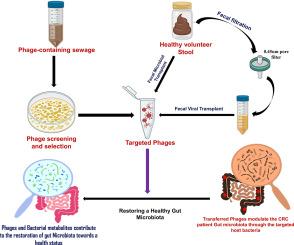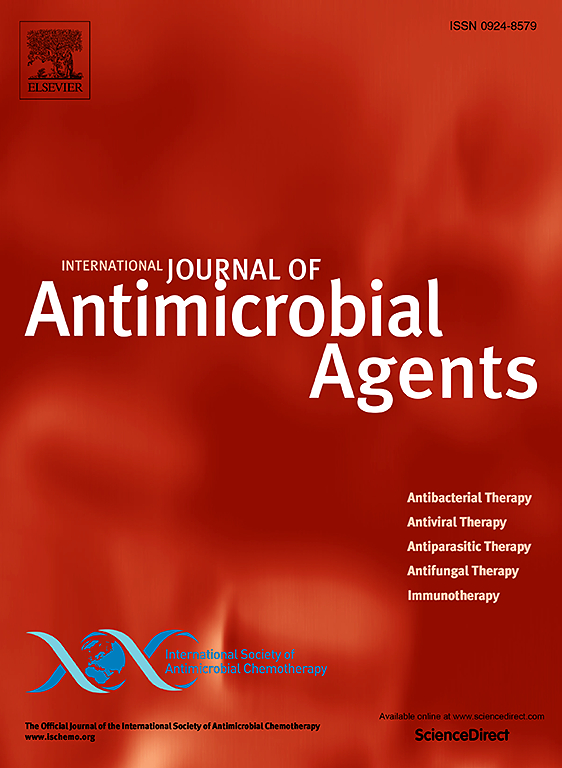Exploring the therapeutic potential of bacteriophage-mediated modulation of gut microbiota towards colorectal cancer
IF 4.6
2区 医学
Q1 INFECTIOUS DISEASES
International Journal of Antimicrobial Agents
Pub Date : 2025-07-30
DOI:10.1016/j.ijantimicag.2025.107585
引用次数: 0
Abstract
Objectives
Given a strong association between gut dysbiosis and colorectal cancer (CRC), this review aims to explore the potential of phage therapy as a targeted intervention that can selectively eliminate CRC-associated bacteria and restore a healthy gut microbiota.
Methods
A comprehensive literature search was conducted in Web of Science, PubMed, and Google Scholar to identify studies published within the last decade relevant to gut microbiota, phage therapy, and colorectal cancer (CRC). The search strategy employed the following keywords and Boolean combinations: “gut microbiota” AND “colorectal cancer”; “gut microbiota” AND “phage therapy”; “phage therapy”; “phage therapy” AND “colorectal cancer”; “gut dysbiosis” AND “colorectal cancer”; and “gut microbial modulation” AND “colorectal cancer.”
Results
Tailored phage-based strategies, such as phage cocktails and Fecal Microbial Transplantation (FMT), have demonstrated therapeutic potential in modulating disease-associated microbiota. However, the clinical application of FMT is limited by safety concerns, particularly the risk of transferring intact bacteria with pathogenic potential. In this review, we highlight Fecal Viral Transplantation (FVT) as a promising and safer alternative, where filtered fecal samples containing phages are transferred, eliminating intact bacteria that could otherwise cause adverse effects.
Conclusions
Phage therapy represents a promising strategy to modulate gut microbiota and improve CRC treatment by selectively targeting CRC-associated bacteria. However, its clinical translation in the context of CRC remains dependent on further experimental and clinical studies to establish its safety and efficacy to patients.

探索噬菌体介导的肠道微生物群调节对结直肠癌的治疗潜力。
结直肠癌(CRC)的发病率不断上升,特别是在年轻人中,迫切需要采取预防和治疗策略,以减少与结直肠癌治疗相关的死亡率和经济负担。研究表明,肠道生态失调与结直肠癌相关,这表明恢复健康的肠道微生物群可以改善结直肠癌的预后。传统抗生素可以快速消除crc相关的肠道微生物群,然而,它们缺乏分类精度导致非选择性消除促肿瘤和抗肿瘤细菌。在这篇综述中,我们探讨了噬菌体治疗特异性靶向和消除CRC相关细菌的潜力,从而减轻它们在CRC发病中的作用。量身定制的噬菌体疗法,包括噬菌体鸡尾酒和粪便微生物移植(FMT),在治疗多种疾病方面显示出希望。由于FMT的有效性受到安全性的关注,我们在这篇综述中强调了粪便病毒移植(FVT)如何提供一种更安全的替代方法,即使用过滤后的粪便样本,而这些粪便样本中没有可能导致不良反应的完整细菌。FVT是一个相对较新的领域,具有复杂的宿主-噬菌体相互作用,需要进一步研究以充分了解其潜力和安全性。尽管噬菌体疗法具有调节肠道微生物群和改善结直肠癌治疗的潜力,但仍需要更多的临床研究和实验证据来进一步确定其在结直肠癌患者中的有效性和安全性。
本文章由计算机程序翻译,如有差异,请以英文原文为准。
求助全文
约1分钟内获得全文
求助全文
来源期刊
CiteScore
21.60
自引率
0.90%
发文量
176
审稿时长
36 days
期刊介绍:
The International Journal of Antimicrobial Agents is a peer-reviewed publication offering comprehensive and current reference information on the physical, pharmacological, in vitro, and clinical properties of individual antimicrobial agents, covering antiviral, antiparasitic, antibacterial, and antifungal agents. The journal not only communicates new trends and developments through authoritative review articles but also addresses the critical issue of antimicrobial resistance, both in hospital and community settings. Published content includes solicited reviews by leading experts and high-quality original research papers in the specified fields.

 求助内容:
求助内容: 应助结果提醒方式:
应助结果提醒方式:


